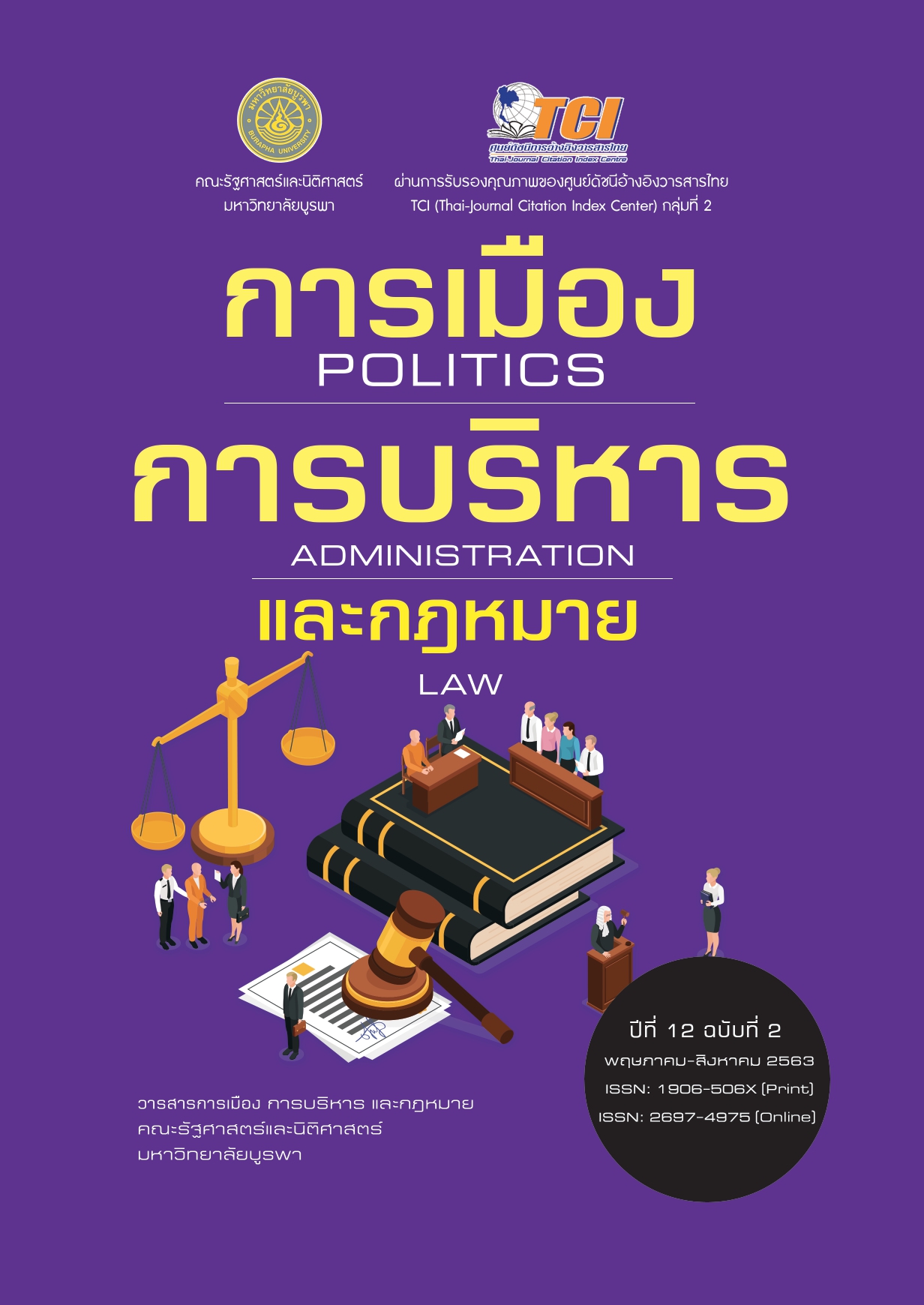ลาวไร้สัญชาติกับปัญหาด้านสิทธิมนุษยชนในสังคมไทย กรณีศึกษา บ้านบะไห่ อำเภอโขงเจียม จังหวัดอุบลราชธานี
คำสำคัญ:
ลาวไร้สัญชาติ, พระราชบัญญัติสัญชาติ, สิทธิมนุษยชนบทคัดย่อ
สัญชาติ นับเป็นหลักพื้นฐานในการเข้าถึงสิทธิต่าง ๆ ในรัฐ และเป็นหลักการที่ได้ถูกยอมรับไว้ในปฏิญญาสากลว่าด้วยสิทธิมนุษยชน (the Universal Declaration of Human Right) ว่ามนุษย์แต่ละคนควรมีหนึ่งสัญชาติ อย่างไรก็ดีเมื่อพิจารณาจากบริบทของสังคมไทย พบว่ามีจำนวนคนไร้สัญชาติในประเทศไทยอยู่จำนวนมาก ซึ่งหนึ่งในจำนวนนั้นคือกลุ่มคนลาวไร้สัญชาติตามแนวชายแดนไทย - ลาว วัตถุประสงค์ของบทความนี้คือ (1) เพื่อศึกษาประวัติศาสตร์ความเป็นมาของกลุ่มคนลาวไร้สัญชาติตามแนวชายแดนไทย - ลาว โดยใช้กรณีศึกษาบ้านบะไห่ อ. โขงเจียม จ. อุบลราชธานี (2) เพื่อศึกษาปัญหาด้านสิทธิมนุษยชนที่กลุ่มคนลาวไร้สัญชาติได้รับผลกระทบเนื่องจากไร้สัญชาติ ศึกษาโดยใช้กระบวนการวิจัยเชิงคุณภาพ (Qualitative Research) โดยศึกษาจากเอกสารที่เกี่ยวข้อง เช่น พระราชบัญญัติสัญชาติของไทย และปฏิญญาสากลว่าด้วยสิทธิมนุษยชน รวมถึงการการลงพื้นที่สัมภาษณ์กลุ่มคนลาวไร้สัญชาติ บ้านบะไห่ อำเภอ โขงเจียม จังหวัดอุบลราชธานี ผลการวิจัยพบว่า สาเหตุของสถานะลาวไร้สัญชาติในรัฐไทย เกิดขึ้นจากสองเงื่อนไข ได้แก่ (1) เงื่อนไขทางประวัติศาสตร์การเมืองการเปลี่ยนแปลงทางการเมืองภายในของประเทศลาวในช่วงปี 2517 ส่งผลให้มีผู้อพยพชาวลาวเข้ามาในประเทศไทยจำนวนมาก และบางส่วนไม่ได้กลับประเทศต้นทางหรือไปตั้งถิ่นฐานใหม่ในประเทศที่ 3 และยังคงมีสถานะไร้สัญชาติในประเทศไทย (2) จากเงื่อนไขจากการกำหนดพระราชบัญญัติสัญชาติของไทย เรื่องการกำหนดเงื่อนไข/ และข้อยกเว้นการได้สัญชาติไทย ส่งผลกระทบต่อกลุ่มคนลาวไร้สัญชาติในประเทศไทย มีสิทธิในการขอสัญชาติไทยต่างกันออกไป บางกลุ่มมีสิทธิในการขอสัญชาติไทย ตามมาตรา 23 ของพระราชบัญญัติสัญชาติ พ.ศ. 2508 ฉบับที่ 4 พ.ศ. 2551 บางกลุ่มยังคง ไม่มีแนวทางจากรัฐในการแก้ปัญหาเรื่องสัญชาติ ทำให้ยังคงสถานะคนไร้สัญชาติในประเทศไทย และ ผลจากการภาวะไร้สัญชาตินำไปสู่การถูกปฏิเสธสิทธิต่าง ๆ จากรัฐ และในบางกรณีส่งผลต่อการละเมิดสิทธิมนุษยชน เช่น สิทธิในการเดินทาง สิทธิในการก่อตั้งครอบครัว เป็นต้น
เอกสารอ้างอิง
คำสั่งกระทรวงมหาดไทยด่วนมาก ที่ มท.0309.1/ว1587 ลงวันที่ 22 พฤษภาคม พ.ศ. 2551.
จินตนา เมืองแมน. (2555). ความสัมพันธ์ระหว่างแนวคิดว่าด้วยความเป็นพลเมืองและสัญชาติในพระราชบัญญัติสัญชาติกับการผลิตสร้าง “คนไร้สัญชาติ” ในรัฐไทย. วิทยานิพนธ์ปริญญามหาบัณฑิต, สาขาการปกครอง, คณะรัฐศาสตร์, มหาวิทยาลัยธรรมศาสตร์.
จันทรา ธนะวัฒนาวงศ์ และคณะ. (2553). รายงานวิจัยเรื่อง แนวทางและกลไกการแก้ไขปัญหาของความทับซ้อน/กำกวมระหว่างคนไร้รัฐกับแรงงานต่างด้าวสัญชาติลาว: กรณีศึกษาพื้นที่อำเภอบุญฑริก จังหวัดอุบลราชธานี. กรุงเทพฯ: สำนักงานกองทุนสนับสนุนการวิจัย (สกว.).
ชลิต ถาวรนุกิจกุล. (2547). บทวิเคราะห์แนวคิดทางการเมืองเบื้องหลังพระราชบัญญัติสัญชาติ พ.ศ. 2508. วิทยานิพนธ์ปริญญามหาบัณฑิต, ภาควิชาการปกครอง, สาขาวิชาการปกครอง, คณะรัฐศาสตร์, จุฬาลงกรณ์มหาวิทยาลัย.
ชุมพร ปัจจุสานนท์. (2546). กฎหมายระหว่างประเทศแผนกคดีบุคคล สัญชาติ (ภาค 1). กรุงเทพฯ: วิญญูชน.
ดวงพร ศิลปวุฒิ. (2535). นโยบายของรัฐบาลไทยต่อผู้ลี้ภัยกับปัญหาสิทธิมนุษยชน: กรณีศูนย์พนัสนิคม. สารนิพนธ์ปริญญามหาบัณฑิต, สาขาการปกครอง, คณะรัฐศาสตร์, มหาวิทยาลัยธรรมศาสตร์.
ประสิทธิ์ ปิวาวัฒนพานิช. (2554). คำอธิบายกฎหมายระหว่างประเทศแผนกคดีบุคคล (พิมพ์ครั้งที่ 2) กรุงเทพฯ: มหาวิทยาลัยธรรมศาสตร์.
ปิ่นแก้ว อุ่นแก้ว. (2550). คนไร้รัฐ ไร้สัญชาติในรัฐไทย: เรื่องเล่าของเส้นทางสู่การมี “ตัวตน” บนแผ่นดินนี้. กรุงเทพฯ: วิญญูชน.
พระราชบัญญัติสัญชาติ พ.ศ. 2508 ฉบับที่ 4 (แก้ไข พ.ศ. 2551). (2551, 27 กุมภาพันธ์). ราชกิจจานุเบกษา. เล่มที่ 125 ตอนที่ 39 ก.
พันธุ์ทิพย์ กาญจนะจิตรา สายสุนทร. (2534). เอกสารประกอบการสัมมนาเรื่อง "กฎหมายสัญชาติ: ปัญหาและแนวทางแก้ไข”. กรุงเทพฯ: คณะนิติศาสตร์ มหาวิทยาลัยธรรมศาสตร์.
พันธุ์ทิพย์ กาญจนะจิตรา สายสุนทร. (2538). คำอธิบายกฎหมายสัญชาติไทย ภายใต้ พ.ร.บ.สัญชาติ 2508 ซึ่งถูกแก้ไขโดย พ.ร.บ.สัญชาติ (ฉบับที่ 2 และ 3) พ.ศ. 2535 (พิมพ์ครั้งที่ 2 ฉบับแก้ไข ปรับปรุง). กรุงเทพฯ: นิติธรรม.
พันธุ์ทิพย์ กาญจนะจิตรา สายสุนทร. (2550). ความเป็นไปได้ที่จะขจัดความไร้รัฐให้แก่มนุษย์ในสังคมไทย: ถอดประสบการณ์ของรัฐไทย. ใน รวมบทความงานวิชาการประจำปี 2550 (ครั้งที่ 3). กรุงเทพฯ: คณะนิติศาสตร์ มหาวิทยาลัยธรรมศาสตร์.
รวีวรรณ แพทย์สมาน. (2560). การศึกษาของเด็กไร้สัญชาติ ตามนโยบายเรียนฟรี 15 ปี ในประเทศไทย. วารสารการเมือง การบริหาร และกฎหมาย, 9(3), 241-242.
ศิริศักดิ์ คชสวัสดิ์. (2554). คนไร้รัฐเมืองอุบล. สารแม่มูน, 8(กรกฎาคม 2552- มิถุนายน 2554), 27-28.
สุชาดา ทวีสิทธิ์. (2552). พลเมืองจินตนาการกับคนลาวไร้รัฐที่ชายแดนภาคอีสาน. วารสารศิลปศาสตร์ มหาวิทยาลัยอุบลราชธานี, ฉบับพิเศษ, 72-126.
สุชาดา ทวีสิทธิ์ และสุรสม กฤษะจูฑะ. (2555). ภาวะไร้สัญชาติ – ไร้รัฐ ชายแดนอีสาน คนลาวอพยพ.อุบลราชธานี: ศูนย์วิจัยสังคม อนุภูมิภาคลุ่มน้ำโขง คณะศิลปศาสตร์ มหาวิทยาลัยอุบลราชธานี.
สุวรรณี เข็มเจริญ. (2547). สิทธิในการศึกษาของคนไร้สัญชาติในประเทศไทย. วิทยานิพนธ์ปริญญามหาบัณฑิต, คณะนิติศาสตร์, มหาวิทยาลัยธรรมศาสตร์.
สำนักงานสถิติแห่งชาติ กระทรวงดิจิทัลเพื่อเศรษฐกิจและสังคม. (2560). รายงานผลการสำรวจข้อมูลพื้นฐานของครัวเรือน พ.ศ. 2561 ทั่วราชอาณาจักร. วันที่ค้นข้อมูล 10 พฤษภาคม 2562, เข้าถึงได้จาก http://www.nso.go.th/sites/2014/DocLib13/2561.pdf
Mapp, S. C. (2008). Human Rights and Social Justice in a Global Perspective: An Introduction to International Social Work. New York: Oxford University Press.
Silving, H. (1956). Nationality in Comparative Law. The American Journal of Comparative Law, 5(no.3 summer), 410-442.






